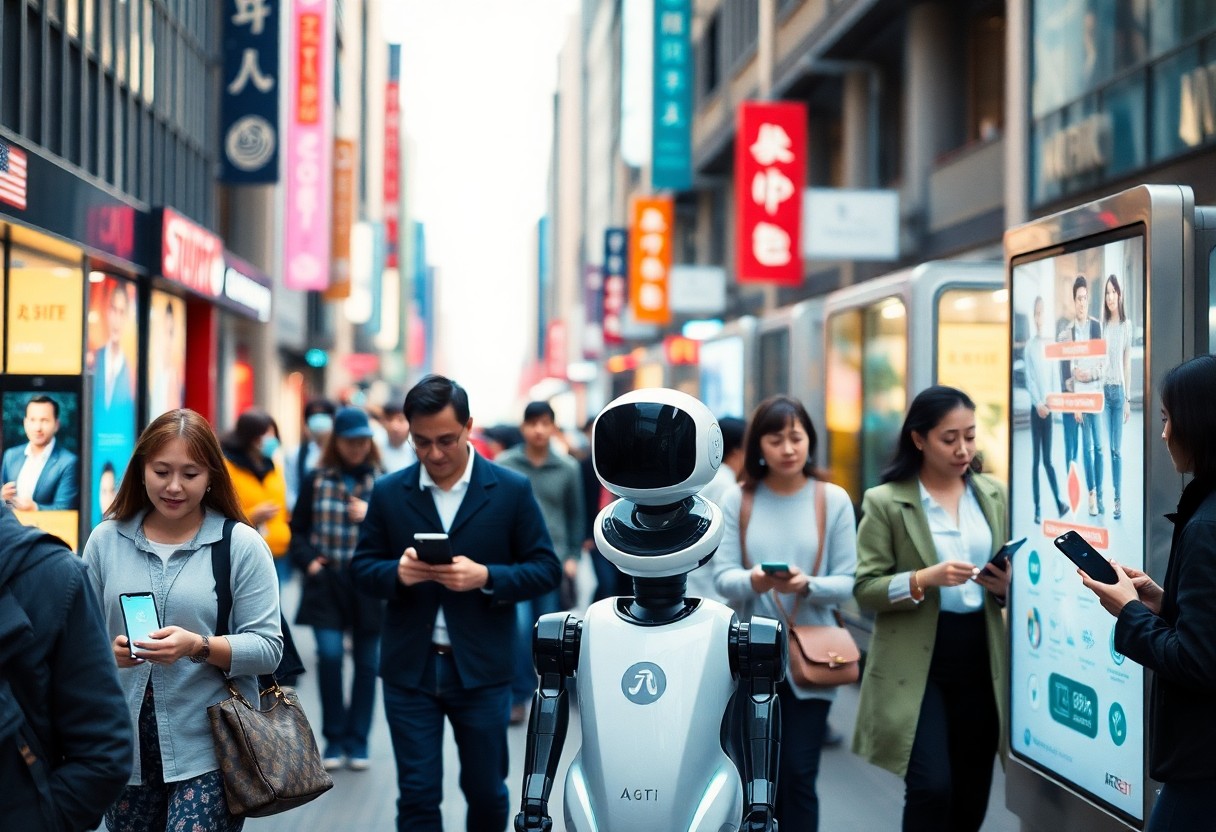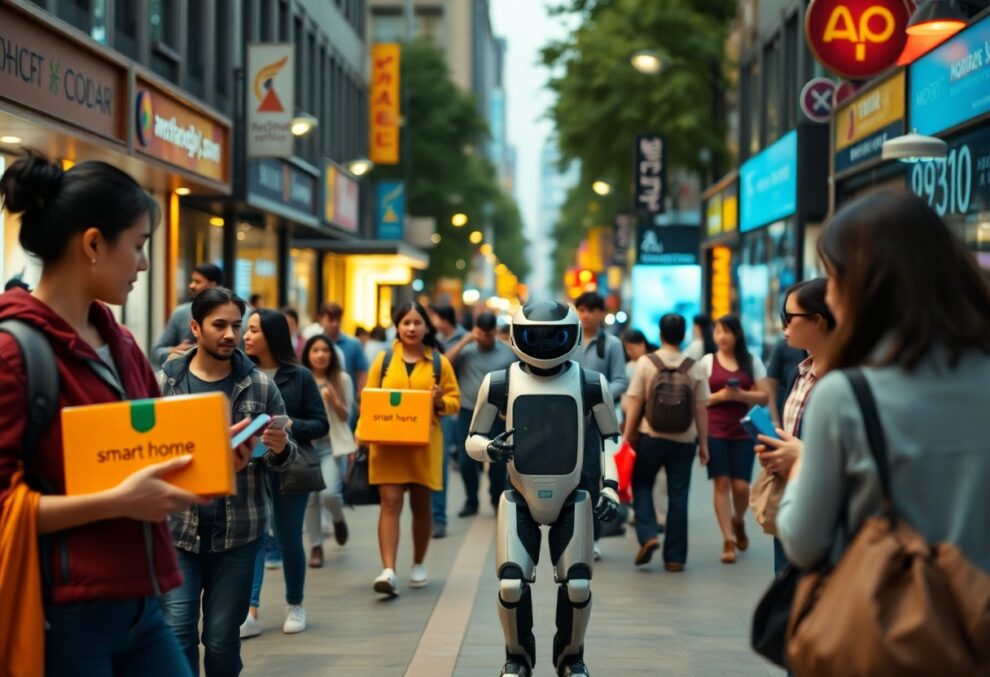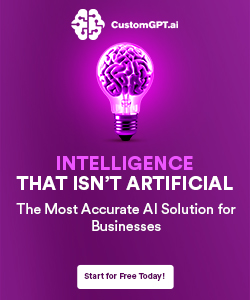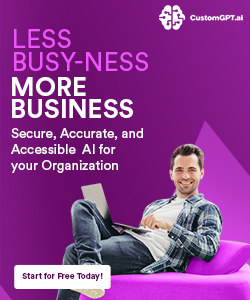Over the past few years, artificial intelligence has woven itself into the fabric of your daily life, often in ways you may not even realize. From smart assistants that help manage your schedule to algorithms that curate your social media feeds, AI technologies play a significant role in enhancing convenience and efficiency. This blog post will explore various applications of AI that you encounter regularly, shedding light on how these innovations impact your decision-making, improve personal experiences, and streamline numerous tasks throughout your day.

Understanding AI: A Brief Overview
To grasp the impact of artificial intelligence (AI) in our lives, it’s important to understand what AI encompasses and how it operates. AI refers to the capability of machines to perform tasks that typically require human intelligence, such as problem-solving, learning, and decision-making. This foundation sets the stage for exploring the myriad applications that AI brings into your daily experiences.
Definition of Artificial Intelligence
One of the most fundamental definitions of artificial intelligence is that it refers to the simulation of human intelligence processes by machines, particularly computer systems. These processes include learning, reasoning, and self-correction, allowing AI to adapt to new information and perform complex tasks with greater efficiency than humans.
Types of AI Technologies
Between the vast landscape of AI applications, various technologies stand out. AI can primarily be categorized into three types: narrow AI, general AI, and superintelligent AI. Each type serves different purposes and capabilities, influencing how you interact with technology. Here’s a breakdown:
| Narrow AI | Specialized systems for specific tasks (e.g., chatbots) |
| General AI | Theoretical systems with human-like intelligence |
| Superintelligent AI | AI surpassing human intelligence (hypothetical) |
| Reactive Machines | Basic systems that perform specific tasks |
| Predictive Analytics | Analyzes data to predict future outcomes |
To further understand these technologies, you should consider their applications in various sectors such as healthcare, finance, and customer service. For instance, narrow AI powers personal assistants and recommendation systems that enhance user experience. Here’s an additional breakdown of types:
- Narrow AI: Focused on specific tasks
- General AI: Hypothetical and not yet realized
- Reactive Machines: Basic AI with set rules
- Limited Memory: Learns from past experiences
- Self-Aware AI: Future possibility of sentient machines
| Narrow AI | Widespread applications in everyday tasks |
| General AI | Still an area of research and theory |
| Reactive Machines | Examples include chess programs |
| Limited Memory | Used in autonomous vehicles |
| Self-Aware AI | Far-off concept associated with advanced robotics |
AI in Healthcare
Assuming you are curious about how artificial intelligence is transforming healthcare, you will find that its applications are significantly enhancing patient care and treatment options. From diagnosing diseases more accurately to streamlining administrative processes, AI is reshaping the landscape of medical services, making them more efficient and accessible for you and your healthcare providers.
Diagnostic Tools and Predictive Analytics
Between the advances in machine learning and data analysis, diagnostic tools equipped with AI can identify patterns in medical data that may be invisible to human practitioners. These predictive analytics enhance the accuracy of diagnoses and allow healthcare professionals to anticipate patient needs, optimizing treatment plans and improving overall outcomes.
Personal Health Assistants
Predictive capabilities of AI have paved the way for personal health assistants designed to help you manage your health more effectively. These digital tools can track your symptoms, monitor chronic conditions, and remind you about medications, creating a tailored approach to your healthcare needs.
Personal health assistants leverage AI to analyze your data and provide you with customized insights and recommendations. By integrating with wearable devices and health apps, they can offer real-time tracking of your vital signs, encouraging proactive health management. You can receive reminders for medication, schedule appointments, and even access health information tailored to your specific conditions, empowering you to take control of your health and wellness.
AI in Education
There’s no denying that AI is transforming education in remarkable ways. From enhancing learning experiences to improving administrative processes, AI technologies are making education more accessible and personalized. You can expect to see intelligent tutoring systems, automated grading software, and predictive analytics that tailor education to fit your needs and those of your peers.
Personalized Learning Experiences
The introduction of AI into education allows for personalized learning experiences that cater to your learning style and pace. AI can analyze your progress and adapt the curriculum accordingly, ensuring you grasp difficult concepts before moving on. This tailored approach not only enhances comprehension but also keeps you engaged with the material, leading to better retention and academic success.
Administrative Efficiency
Beside enhancing student learning, AI also streamlines administrative tasks, freeing up valuable time for educators and staff. Automated processes, such as enrollment management, scheduling, and resource allocation, reduce the burden on your educational institution, allowing for a more organized and efficient environment.
But it’s crucial to consider how AI can further enhance administrative efficiency in educational settings. By implementing AI-driven analytics and management tools, institutions can monitor and analyze various operational aspects in real-time. This can lead to better resource allocation, reduced processing times, and improved communication channels, ultimately creating a more effective educational framework. As a result, educators can focus on their teaching responsibilities instead of administrative burdens.
AI in Transportation
Many people may not be aware of the significant impact artificial intelligence has on transportation. From ride-sharing applications to logistics management, AI technologies streamline operations, enhance safety, and reduce costs, making your travel experiences more efficient and enjoyable.
Autonomous Vehicles
Along with the development of autonomous vehicles, AI plays a vital role in your daily commute. These smart cars utilize advanced sensors and machine learning algorithms to navigate roads, interpret traffic signals, and avoid obstacles, ultimately transforming your idea of personal transportation.
Traffic Management Systems
After identifying traffic congestion as a major challenge, cities are increasingly leveraging AI in traffic management systems. By analyzing real-time data from cameras and sensors, these systems can dynamically adjust traffic lights and provide route recommendations to minimize delays.
Considering the benefits of AI-driven traffic management systems, you can expect a smoother journey. By continuously learning from traffic patterns, these systems optimize the flow of vehicles, reduce travel times, and promote safer road conditions. This technology not only improves your daily travel experience but also contributes to a more sustainable urban environment by minimizing congestion and decreasing emissions.
AI in Retail
After transforming various industries, AI is making a significant impact in retail, reshaping how businesses engage with customers and manage their operations. With the integration of AI technologies, retailers can enhance customer experiences, streamline supply chains, and optimize inventory management, all contributing to increased operational efficiency and improved financial outcomes. You can find AI applications in personalized marketing, automated checkouts, and advanced data analytics, all designed to enhance your shopping experience and meet demand more effectively.
Customer Experience Enhancements
On the forefront of retail innovation, AI enhances customer experiences through personalized recommendations and tailored marketing strategies. By analyzing your shopping behavior and preferences, AI algorithms suggest products that align with your interests, leading to a more engaging and convenient shopping experience. Chatbots and virtual assistants further enrich your interaction with brands by providing instant support and guidance, ensuring that help is always just a click away.
Supply Chain Optimization
Below the surface, AI plays a vital role in optimizing supply chains to ensure products are available when you need them. By leveraging predictive analytics, AI can forecast demand patterns more accurately, helping retailers reduce excess inventory and prevent stockouts. This leads to enhanced efficiency, lower costs, and a smoother shopping experience for you.
Also, AI-driven tools facilitate real-time monitoring of inventory levels and logistics, enabling retailers to respond quickly to fluctuations in demand or disruptions in supply. By automating data analysis, retailers can make informed decisions that improve overall supply chain performance. This means you benefit from timely product availability and more reliable delivery schedules, enhancing your overall satisfaction as a consumer.
The Impact of AI on Employment
Despite concerns about automation, AI is transforming the employment landscape rather than simply reducing job opportunities. While some roles are being replaced, many industries are adapting and evolving, leading to new job functions and growth in sectors requiring advanced technological skills. This shift necessitates an understanding of how to navigate the changing job market and leverage the benefits of AI for your career development.
Job Displacement vs. Job Creation
On one hand, AI-driven automation may displace certain jobs, particularly in routine and manual sectors. On the other hand, it creates new roles in areas like AI management, data analysis, and technological development. For you, this means considering ways to align your skills with future job demands, enabling you to thrive in an evolving workplace.
The Need for Reskilling
With the rapid advancements in AI technology, reskilling has become necessary for workers to remain competitive. As roles evolve, your ability to adapt and learn new skills in tech-centric areas will determine your career longevity and success in the changing job landscape.
A proactive approach to reskilling involves seeking out learning opportunities such as online courses, workshops, or certifications related to AI and its applications. Stay informed about industry trends to identify the skills that are gaining importance and be open to reinventing your professional identity. By actively engaging in continuous learning and development, you enhance your employability and position yourself advantageously in a job market increasingly influenced by AI innovations.
Conclusion
With these considerations, you can see that the role of AI in everyday life extends far beyond mere automation. From personal assistants managing your schedule to AI-driven algorithms enhancing your online shopping experience, these technologies shape how you interact with the world around you. Embracing AI not only improves efficiency but also unlocks new possibilities for creativity and innovation in your daily tasks. As AI continues to evolve, staying informed about its applications can empower you to leverage its benefits effectively.
FAQ
Q: How is AI transforming the way we communicate with each other?
A: AI is significantly enhancing communication through various tools and platforms. For instance, machine learning algorithms power virtual assistants like Siri and Google Assistant, which can understand and respond to natural language, making it easier to ask questions and receive information quickly. Additionally, AI-driven translation services, such as Google Translate, break down language barriers by providing instant translations, thus allowing people from different linguistic backgrounds to connect more efficiently. Social media platforms utilize AI to tailor content recommendations, ensuring users see posts and images that are relevant to them, which fosters engagement and interaction.
Q: In what ways is AI being utilized in healthcare?
A: AI is revolutionizing healthcare by improving diagnosis, treatment plans, and patient care. Machine learning algorithms analyze medical data to help doctors identify diseases early, such as detecting cancers in imaging scans. AI-powered chatbots are also being deployed in telehealth services to provide patients with preliminary assessments and answer common health inquiries. Furthermore, AI systems can assist in drug discovery by identifying potential compounds that can lead to new medications, therefore accelerating the development of treatments. These applications contribute to more accurate and personalized healthcare solutions.
Q: Can you explain the role of AI in smart home technology?
A: AI greatly enhances smart home technology by enabling devices to learn from user habits and preferences, leading to more efficient and convenient living. Smart thermostats, like Nest, adapt to users’ schedules to optimize heating and cooling, thereby conserving energy. Voice-activated systems, such as Amazon Echo and Google Home, allow users to control lighting, security systems, and appliances with simple voice commands. AI also plays a part in home security, where smart cameras can recognize familiar faces and send alerts if they detect unusual activity. Together, these innovations create a more seamless and automated living environment.










